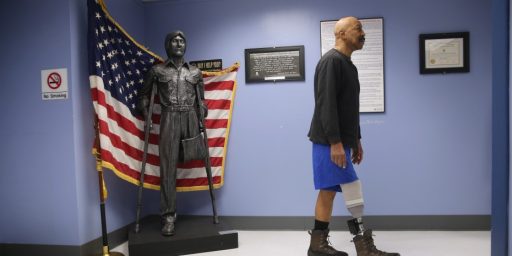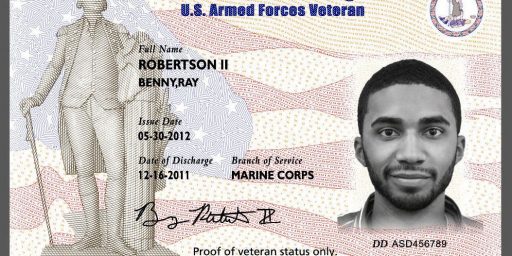Veterans Day, 2005
Today is Veterans Day, a date set aside to honor those who have served in the armed forces.
World War I officially ended on June 28, 1919, with the signing of the Treaty of Versailles. The actual fighting between the Allies and Germany, however, had ended seven months earlier with the armistice, which went into effect on the eleventh hour of the eleventh day of the eleventh month in 1918. Armistice Day, as November 11 became known, officially became a holiday in the United States in 1926, and a national holiday 12 years later. On June 1, 1954, the name was changed to Veterans Day to honor all U.S. veterans.
In 1968, new legislation changed the national commemoration of Veterans Day to the fourth Monday in October. It soon became apparent, however, that November 11 was a date of historic significance to many Americans. Therefore, in 1978 Congress returned the observance to its traditional date.
You can send a message of thanks to our veterans here:
The Library of Congress’s Veterans History Project has a huge collection of first-hand accounts of the combat experiences of veterans from World War I through the Afghanistan and Iraq Wars.
Read President Bush’s Veterans Day, 2005 Proclamation
Blogging Veterans:
-
Donald Sensing
Matt at Blackfive
Scott “Smash” Koenig
John Cole
Greyhawk
John Donovan
Jeff Quinton
Juliette Ochieng
Laughing Wolf
Jawa Report guestblogger Vinnie
Joe Katzman
Thomas “Jack Army” Nichols
Austin Bay
Bloggers Thanking Veterans:
-
Dean Esmay
LaShawn Barber
Kathy Kinsley
Russ Emerson
Susie Madrak
Peter Shinn
Dan Spencer
Michael Demmons
Michelle Malkin
Jason Smith
Basil
Let me know if I’ve inadvertantly put you in the wrong category. If I missed you–or you hadn’t posted yet when I compiled this list–feel free to plug your post in the comments and/or to send a trackback.






November 11 always makes me recall the failure to force the Dardanelles in 1915, on which I muse at my trackback-less blog.
Entropy House and The Lord of the Peeps are extremely grateful for the men and women who served and have served our country.
I linked to ya but can’t get the trackback to work.
Anyhow, thanks for joining the cadre of voices thanking our veterans.
rv: Hmm–you’re not getting caught in any of my filters. Not sure what the deal is.
Never forget which country is vastly more responsible than all others put together for actually beating Germany in World War I: FRANCE. Without them, the war would have certainly ended in a German victory and there’s not a damn thing America or anyone else could have done about it.
Also never forget which country is vastly more responsible than all others put together for actually beating Nazi Germany in World War II: the SOVIET UNION. Compared with them, all other Allied contributions shrink into insignificance. Without them mortally weakening the German war machine the rest of the world would STILL be waiting for the western Allies to land in occupied France, which was itself a mere sideshow by comparison to the Soviet efforts on the Eastern Front. Happy Veterans Day.
It always bothers me that November 11th, which is celebrated around the world as the day that peace came to a horrible war, has become a day in the US to honour veterans.
There is something about the original intent which transcends nations.
Here in Australia we have a different solution to the problem. We remember Armistice Day, but we celebrate April 26th, Anzac Day, to honour the veterans and the horrors of our particular history. As mentioned above, April 26th is a date from the story of the Dardanelles, the date on which Australian forces landed at Gallipoli.
I should also record that Anzac Day is a much bigger deal now than Armistice Day.